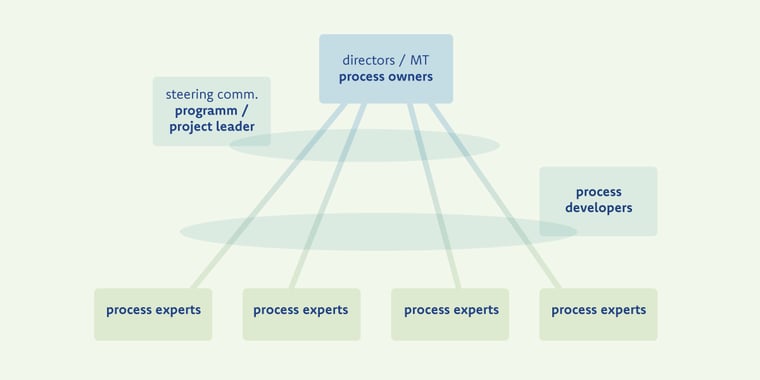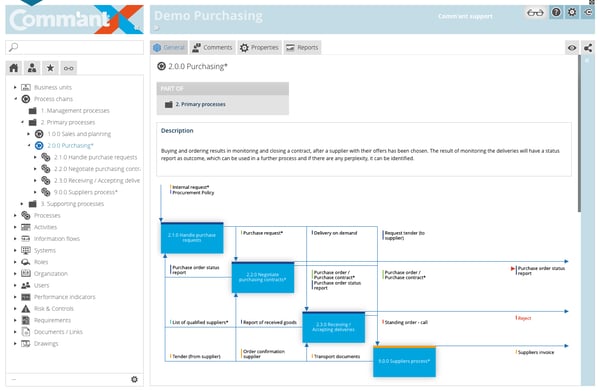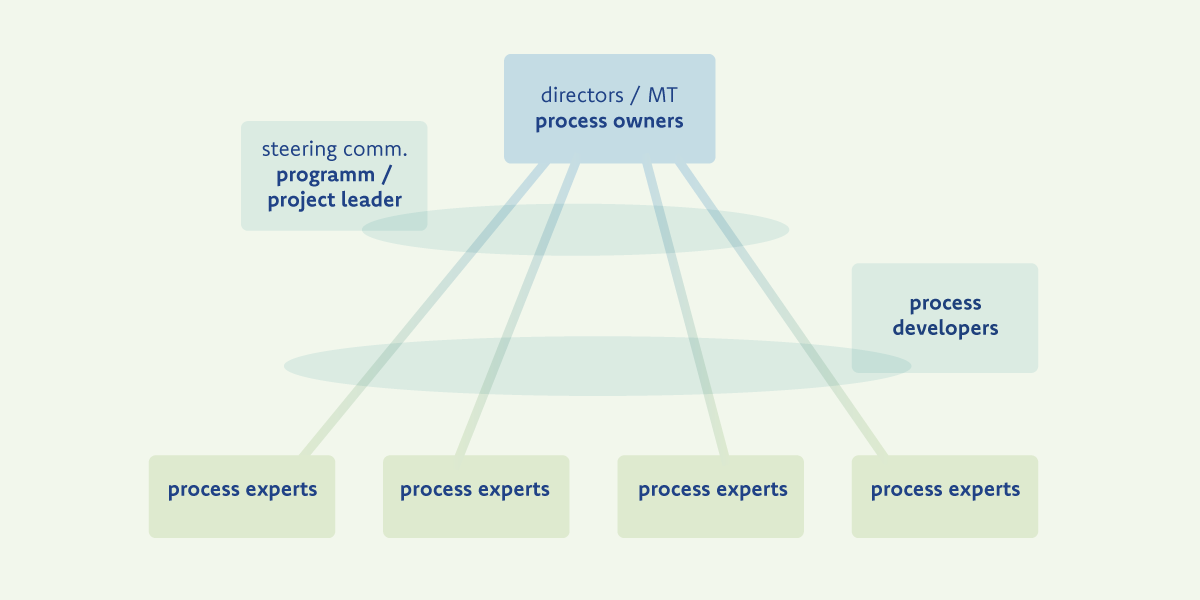The servant Process Owner or Process Leader (Process Teams, part 1)
Ready to get serious about process improvement within your organisation? Then it is recommended to set up a process team for each process, consisting of a process leader or owner (or also: Business Process Owner), several process experts and a process developer.
A process team is responsible for the development of one or more processes: think process agreements, improvements, implementation and controls. This ensures that an effective process is created and implemented that meets your organisation's objectives.
After all, a well-organised process saves a lot of time and money!
In this series of articles, we will look at the function and tasks of the different members of the process team. In this first article, we will look at the role and tasks of the process owner or leader.
The process team series consists of the following articles:
- Part 1: the servant process leader or process owner »
- Part 2: the skilled process expert »
- Part 3: the connecting process developer »
- Part 4: the mobilising process trainer »
The basics: a process team, what is it?
Before going into the role and tasks of the process owner or leader, it is useful to reflect on what exactly is meant by a process team. A process team is a group of people who work together within an organisation to ensure that a number of processes under their responsibility are implemented, run smoothly and are improved where possible.
This team usually consists of a process leader or owner, process expert(s), helpers and a supporting process developer. Sometimes the team may also include (temporarily) other roles, depending on the organisation and the processes it has to deal with. Think stakeholders of a neighbouring process, or users of the final process.
So what does that look like in an organisation? 
For example like this. Good to know is that a steering committee is often only present in larger organisations, in smaller companies it is not necessary.
So there are several process teams in an organisation. For example, you might have a process team for the sales process, another team for the production process and yet another process team for the personnel processes. You can set this up in the way that suits your organisation. In doubt about the best composition for your organisation? We will be happy to think along with you.
The process team works together to map the process, make process agreements, collect feedback and improve the process. After making process agreements, they communicate them to the wider group of managers and executive teams. In doing so, they ensure support for good execution according to the process agreements.
Role and tasks of the process owner (Business Process Owner)
The process owner is often a member of the management, someone with substantive knowledge of the organisation and its processes. He or she is responsible for monitoring, managing and developing one or more processes.
In our view, the process owner is primarily a servant role. He or she connects the strategic level with the operational level and thus helps to improve the processes.
But what does the role of a process owner or leader look like? Below, we explain different parts of the task package. Good to know is that it is not black and white, the role can be set up slightly differently in each organisation.
1. Steering and developing the organisation by results and processes
As a process owner, and therefore often also as a member of the board, it is your job to ensure that the organisation is organised "maturely". By this we mean that you develop the organisation based on clear processes and their results.
This sounds logical, but we often see that this is where things go wrong. Young, start-up companies often steer by feel, where there is no clear and proven strategy to achieve the goals. The result? It remains unclear what the real improvement opportunities are, and impossible to measure whether changes have an effect.
As process owner, you are the one to put an end to this. For the processes you are responsible for, you ensure that clear processes and agreements are implemented.
2. Strategy-based policy
To achieve this, it is important that the process owner, together with the entire process team, ensures that the processes and results are aligned with the organisation's quality requirements and objectives.
So this is where connecting strategic level with operational level comes into play again. At the strategic level, various facets come around the corner: think policy frameworks, standards and requirements, review frameworks, and KPIs.
It is up to the process owner to properly transfer the strategic policy and the resulting preconditions to the process team, so that they can properly formulate the process agreements.
This is a continuous process, in which you need to regularly evaluate whether the processes are still in line with the organisational objectives.
3. Boosting clear processes and connect them as a chain
Together with other process owners, you ensure that there is a "process culture" in the organisation.
A stand-alone process does not remain. That is why it is important that, as a process owner, you ensure that there is coherence between all processes, and that all departments are actively engaged in improving their processes. After all, a chain is only as strong as its weakest link.
In doing so, also draw out which other processes are related to yours. If you are responsible for Sales, you undoubtedly depend on Purchasing or Production. Or on Support Services and HR. Focus on the transfer moments: where does the transfer between two processes take place and how does it take place?
Using process management software such as Comm'ant can help. Comm'ant gives you insight into the process chain, allowing you as process owner to better monitor the coherence and quality of the processes.

4. Review and authorise new processes and process modifications
When a new or improved process is first conceived and described by the process team, it is up to the process owner to confirm that it meets expectations.
As process leader or process owner, it is your job to test the new processes and adjustments for quality. To do this, you assess whether the agreements from the strategic objectives are reflected in the processes.
As process owner, this is the time to ask critical questions: "How does it work if...?", "Why is this so...?", "I wish I knew...".
By asking these questions, you unlock valuable information, which you use to assess whether the processes are ready to go live. If everything is in order, you signal with your approval that the process meets the quality and safety level.
5. Spreading the importance of cooperation based on process agreements
Ensuring acceptance of new processes in an organisation is a skill in itself and therefore requires a lot of attention. As process owner, you act as ambassador and coach for the process.
Sometimes you see resistance within an organisation to implementing new processes. "I've been doing it this way for years, why should I change it?" As a process owner, you can serve the organisation by communicating clearly and showing understanding.
As a process owner, you are the connecting factor between different teams and departments. You promote cooperation between departments by propagating the value of process agreements. In this way, you also encourage teams to actively think along about process improvement and start thinking about innovation with a motivated attitude.
With the right communication and coaching, as a process owner you can contribute to changing the culture in an organisation so that there is more focus on cooperation and process improvement.
6. Inquire how people perceive the process arrangements in practice
It is not just about a good process, but also about how colleagues perceive it. As a process owner, it is therefore important that you inquire whether the process agreements are being applied correctly.
If, for instance, you notice that colleagues on the work floor are not aware of the process agreements made, you can make a plan together with the team leader to ensure that the process agreements are sufficiently disseminated.
In doing so, be the connecting factor between the process and the employees (again). By being open to feedback from all teams involved, you as process owner can assess whether improvements or adjustments are still needed.
Here, it is also important to carry out interim evaluations and show your commitment to process improvement. As process owner, you set an example in this and coach the process team on how to improve their agreements.
7. Leading by example
Good example follows. As process owner, you are the example for the rest of the organisation to follow. At a meeting, for example, always take a moment to recall the process agreements, so that everyone is top-of-mind that these can be found in the management system. This can easily be done with Comm'ant software, for instance.
As a process owner, you are ultimately responsible for the processes, so make sure everything is in place. Show your confidence in the system and lead by example! The rest of the organisation will follow your example in implementing and improving process agreements.
Facilitating assistance, where needed
As a process owner, you have an important task. You are the mediator between different teams coming together in a process team to reach agreements and establish cooperation.
In doing so, be open and engaged. You are able to ask the right questions and make critical yet constructive comments so that everyone can reach a good solution. Facilitate a creative and stimulating environment so that colleagues dare to step out of their comfort zone and solve problems together.
In this role, you are ultimately responsible for creating an effective process team. Therefore, it is important that you ensure that everyone involved gets the help they need to perform their tasks.
Next-level process management using Comm'ant
With Comm'ant's software, organisations take a quantum leap with process management. The software offers extensive possibilities to document, monitor and improve processes.
When you get started with Comm'ant, we are happy to share our more than 20 years of process management knowledge and experience.
Planning based on your situation and needs
We start by investigating your situation and specific needs. Based on this, we develop a plan of action and planning based on result-oriented process management. After this has been agreed with you, we start the programme and projects.
Implementing management system and setting up & training process teams
This obviously includes preparing the new management system, but also training process leaders, experts and developers. We help you start up and supervise process teams, and of course facilitate process owners and the steering committee where necessary.
Want to know more? Then book a no-obligation demo with our process specialists.




